12 Volt DC Capacitor: Reliable Performance for Your Electronics
A 12 volt DC capacitor is a key component in electronic circuits that helps maintain a stable DC voltage supply by storing and releasing energy. These capacitors are used in a wide range of applications, from power smoothing to voltage regulation in various electronic devices. Understanding the function and application of 12V DC capacitors is crucial for engineers and designers looking to optimize power systems.
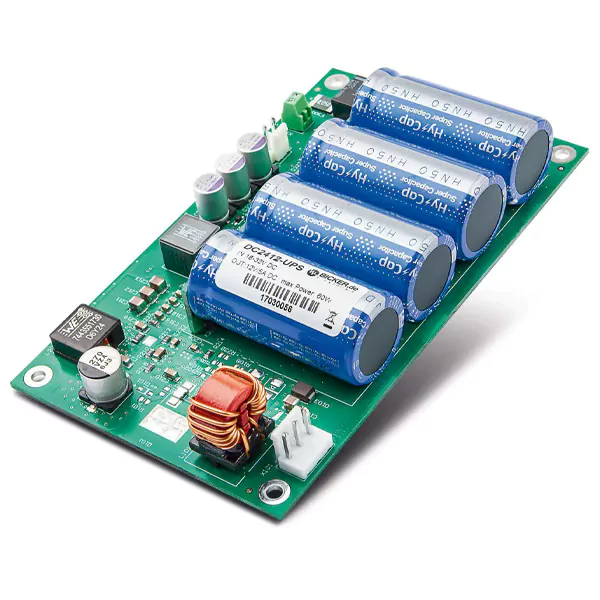
12 Volt DC Capacitor
Our 12 volt DC capacitor is designed for efficient energy storage and smooth power supply in electronic circuits. Ideal for low-voltage applications, this capacitor ensures stable voltage delivery and minimizes fluctuations in power, making it perfect for powering sensitive electronics like LED lighting, microcontrollers, and other low-power devices.
24 Volt DC Capacitor
The 24 volt DC capacitor is engineered for higher voltage systems and ensures efficient energy storage and smooth DC voltage output. It is commonly used in power supplies for industrial equipment, automotive applications, and power converters. This capacitor helps to reduce ripple and provides a stable output, crucial for maintaining performance in high-power circuits.
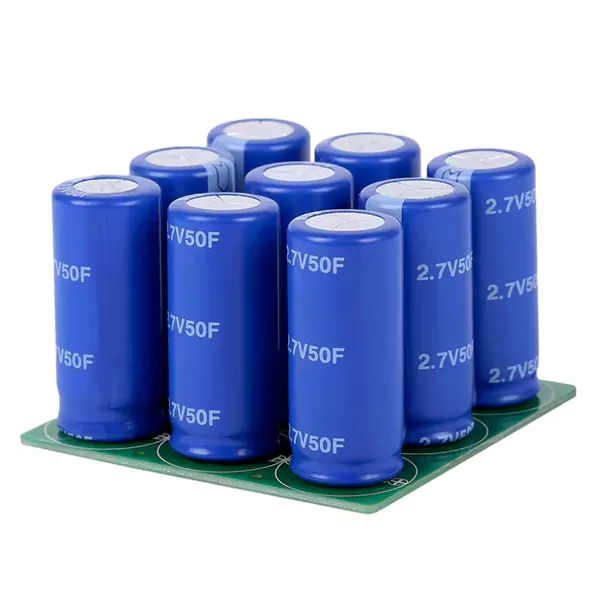
What is a 12 Volt DC Capacitor?
12-volt DC capacitors play a crucial role in electronic circuits by stabilizing voltage, smoothing power supplies, and ensuring reliable performance in a variety of applications. Whether in consumer electronics, automotive systems, or industrial machinery, capacitors help to manage fluctuations in DC voltage, protect sensitive components, and optimize overall power efficiency. In this section, we’ll explore how 12V DC capacitors function in different scenarios, using real-world examples to illustrate their importance.
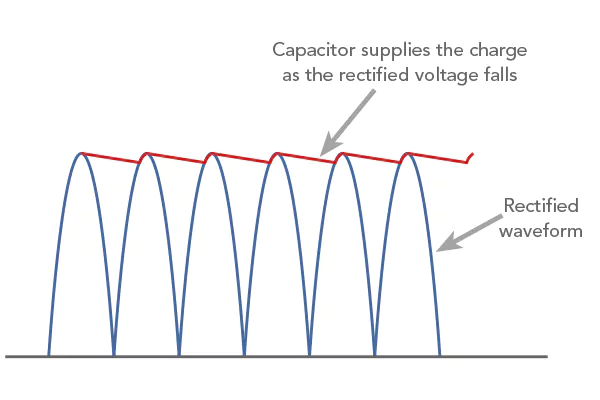
The Role of Capacitors in Smoothing DC Voltage
One of the most common applications of capacitors is smoothing DC voltage. When AC power is converted into DC power through a rectifier, the resulting DC signal often contains ripples or fluctuations. This is problematic for electronic devices that require a stable voltage supply for optimal performance.
For example, in a power supply for an LED lighting system, a 12V DC capacitor can be used to smooth out these ripples, ensuring the LEDs receive a consistent voltage. Without capacitors, the voltage fluctuations would cause the LEDs to flicker or malfunction. By storing and releasing energy, the capacitor fills in the gaps when the voltage drops, effectively leveling out the power supply.
This process, known as capacitor filtering, is essential for creating a steady, ripple-free DC voltage, which is vital for sensitive electronics such as microcontrollers, sensors, and small motors.
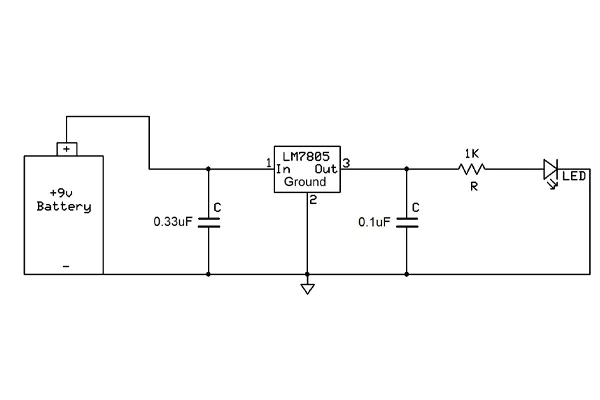
Capacitors for Voltage Regulation: Keeping Systems Stable
Capacitors are also essential for voltage regulation in many systems. In DC circuits, particularly in power supplies and automotive applications, the voltage can sometimes fluctuate due to varying load conditions. For instance, in an electric vehicle, the power supply system must adjust to the varying energy demands of the motor, lights, and other components.
Here, capacitors help to smooth out voltage changes caused by these varying loads. A 12V DC capacitor is often used in conjunction with a voltage regulator to stabilize the voltage before it reaches the components. This ensures that the system always operates within safe voltage limits, protecting sensitive electronics from damage.
In cases where the load suddenly increases (such as when the headlights of a car are switched on), the capacitor quickly discharges to provide additional energy, preventing voltage dips and ensuring the lights operate at full brightness.

Capacitors and DC Voltage Dividers: Lowering Voltage for Specific Applications
Another key application of capacitors in DC circuits is their use in voltage divider circuits. While resistive voltage dividers are commonly used, capacitive dividers can be more efficient in certain applications, especially where the goal is to step down voltage in high-frequency signals or maintain stable performance in specialized devices.
For example, in audio equipment or radio-frequency applications, capacitors are used to create voltage dividers that split the DC voltage into lower levels suitable for different stages of the circuit. In a radio receiver, capacitors in a voltage divider network can lower the DC voltage coming from the antenna to a level that’s safe for the next stage of processing. This helps maintain signal clarity and stability, preventing distortion caused by excessive voltage.
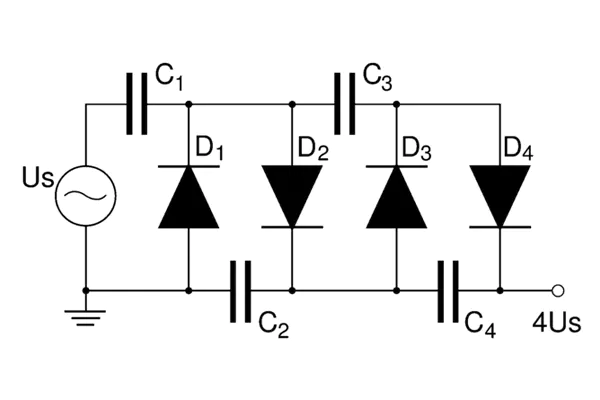
Using Capacitors to Increase or Decrease DC Voltage
Capacitors are also part of DC-DC converter circuits, which can either increase or decrease the voltage depending on the system’s needs. While capacitors alone don’t directly increase or decrease voltage, they can be key components in circuits that do.
For instance, in a voltage booster circuit used in portable power banks, capacitors are used in combination with inductors and diodes to increase the output voltage. These circuits rely on the ability of capacitors to store energy and release it when needed, helping to raise the voltage from a low-level DC input (such as 5V from a USB port) to a higher level (e.g., 12V) that can charge larger devices.
DC Capacitor FAQs
Capacitors are typically classified by their voltage rating and the type of circuit they are designed for. Electrolytic capacitors are most commonly used in DC circuits due to their high capacitance values and ability to store a large amount of charge.
These capacitors are often found in power supply circuits, where they help smooth out the ripples in DC voltage. However, ceramic capacitors and film capacitors can also be used in DC circuits, depending on the application. Tantalum capacitors, another type of electrolytic capacitor, are also designed for DC use and are known for their stability and reliability in low-voltage applications.
It's important to note that while these capacitors can be used in DC circuits, AC-specific capacitors (such as certain types of motor capacitors) are designed to handle the continuous alternating current and should not be used in DC applications due to their construction and performance characteristics.
A faulty DC capacitor can cause several issues in your circuit, including power instability, reduced performance, or even complete failure of the device. Here are some signs that your DC capacitor might be bad:
Visible Damage: Look for any visible bulging, leakage, or discoloration on the capacitor. Bulging is a common sign that the capacitor has failed, often caused by excessive heat or overvoltage.
Power Fluctuations: If you notice unstable power supply or erratic behavior in your electronic device, such as flickering LEDs, inconsistent voltage, or system crashes, the capacitor could be malfunctioning.
Capacitor Failure in Circuit: If you’re using a multimeter with capacitance measurement, test the capacitor. A significant drop in capacitance value from its rated specification could indicate it’s no longer functioning properly.
Smell: A burnt or sour smell coming from the capacitor could indicate internal damage, often due to overheating or over-voltage.
If you suspect the capacitor is faulty, it’s recommended to replace it immediately, as a bad capacitor can lead to further damage to other components in the circuit.
Yes, capacitors can significantly improve car audio systems, especially when it comes to handling high-power demands. Car audio systems often draw substantial current, especially during bass-heavy music or when using high-power amplifiers. This can lead to voltage drops in the car's electrical system, causing dimming headlights or poor audio performance.
A capacitor in a car audio system acts as a power buffer, storing electrical energy and releasing it when there is a sudden demand for more power. This ensures that the amplifier and other audio components receive a steady voltage supply, even when the car’s battery or alternator can’t keep up with the demand. Capacitors help to reduce voltage sag, improve audio clarity, and prevent distortion or performance drops during loud bass notes.
However, it’s important to note that capacitors are not a substitute for a good quality power supply or proper system grounding. They help support the system's performance, but if the electrical system is inadequate, you might need to upgrade the alternator or battery in addition to adding capacitors.